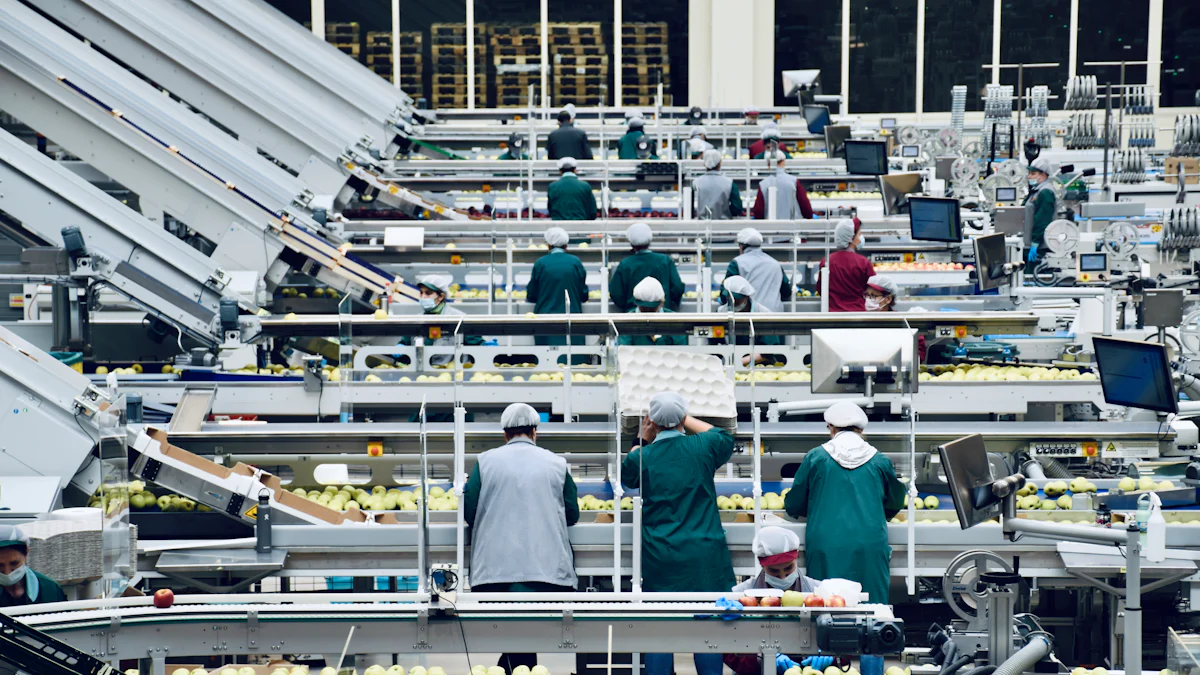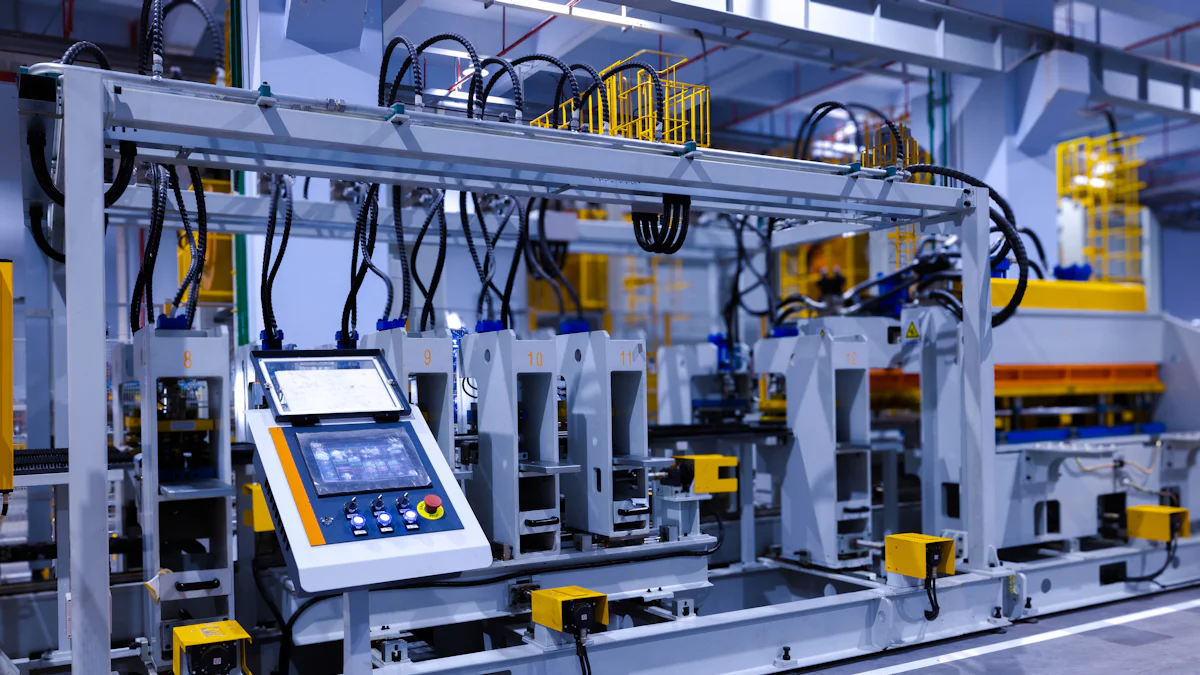Japan's Manufacturing Supply Chain Management Market Size and Future Trends

Japan's manufacturing industry stands as a global powerhouse. In 2021, nearly 177 thousand establishments operated within this sector. Fabricated metal product manufacturers led the charge, employing over 582 thousand people. Supply chain management plays a crucial role in maintaining efficiency and competitiveness in manufacturing. Effective supply chain strategies ensure timely production and delivery of goods. The Japanese Manufacturing Supply Chain holds significant importance on the global stage, influencing international trade dynamics and economic stability.
Japanese Manufacturing Supply Chain Market Size Analysis

Current Market Size
Key Metrics and Statistics
The Japanese Manufacturing Supply Chain market reached a size of USD 8.08 billion in 2022. Analysts project the market to grow at a Compound Annual Growth Rate (CAGR) of 10.9% from 2022 to 2032. By 2032, the market size is expected to hit USD 22.91 billion. The supply chain management software segment is also on the rise, with revenue expected to grow at a CAGR of 2.86% from 2024 to 2029, reaching USD 0.76 billion by 2029.
Comparison with Global Market
Japan's supply chain management market shows robust growth compared to global trends. The global supply chain management market is expanding, but Japan's market exhibits a higher growth rate. This rapid growth positions Japan as a key player in the international supply chain landscape. Japan's advancements in technology and efficient management practices contribute significantly to this trend.
Historical Growth
Trends Over the Past Decade
Over the past decade, the Japanese Manufacturing Supply Chain has seen significant evolution. The market has grown steadily, driven by technological advancements and increased demand for efficiency. The introduction of automation and artificial intelligence has revolutionized supply chain processes. These technologies have enhanced productivity and reduced operational costs.
Major Milestones and Developments
Several milestones have marked the growth of Japan's supply chain market. The adoption of Internet of Things (IoT) technology stands out. IoT technology in Japan is expected to increase the market size from USD 12.65 billion to USD 61.89 billion by 2032, with a CAGR of 17.2%. Another key development is the integration of big data analytics, which has improved decision-making and forecasting accuracy.
Market Segmentation
By Industry Sector
The Japanese Manufacturing Supply Chain spans various industry sectors. Key sectors include automotive, electronics, and fabricated metal products. Each sector has unique supply chain requirements and challenges. The automotive sector, for instance, demands high precision and just-in-time delivery systems.
By Company Size
Market segmentation by company size reveals diverse dynamics. Large enterprises dominate the market, leveraging extensive resources and advanced technologies. However, small and medium-sized enterprises (SMEs) also play a crucial role. SMEs often adopt innovative solutions to remain competitive, contributing to overall market growth.
By Technology Adoption
Technology adoption varies across the Japanese Manufacturing Supply Chain. Advanced technologies like AI, IoT, and big data analytics are more prevalent among larger companies. Smaller firms gradually embrace these technologies to enhance efficiency and competitiveness. The widespread adoption of these technologies drives the market forward.
Key Manufacturers and Players in the Japanese Manufacturing Supply Chain
Leading Companies
Profiles of Major Players
Several key players dominate the Japanese Manufacturing Supply Chain. Nippon Express stands out as a leader, offering comprehensive services like warehousing, transportation, and inventory management. The company excels in optimizing supply chain operations through advanced technologies such as artificial intelligence and the Internet of Things. Yamato Transport also plays a significant role, known for its efficient logistics solutions and extensive network. Sagawa Express provides a wide range of services, including customs clearance and freight forwarding, ensuring smooth international trade.
Market Share Analysis
Market share analysis reveals that large enterprises hold a substantial portion of the market. Nippon Express leads with a significant market share due to its extensive service offerings and technological advancements. Yamato Transport and Sagawa Express follow closely, leveraging their robust infrastructure and innovative solutions. These companies maintain a competitive edge by continuously investing in technology and expanding their service portfolios.
Emerging Players
Innovative Startups
Innovative startups are making waves in the Japanese Manufacturing Supply Chain. Companies like Hacobu and Monoful are introducing disruptive technologies to streamline supply chain processes. Hacobu focuses on digital platforms that enhance logistics efficiency, while Monoful leverages big data analytics to optimize inventory management. These startups bring fresh perspectives and agile solutions, contributing to the market's dynamism.
Disruptive Technologies
Disruptive technologies are reshaping the Japanese Manufacturing Supply Chain. Artificial intelligence and machine learning enable predictive analytics, improving demand forecasting and inventory management. The Internet of Things enhances real-time tracking and monitoring of goods, ensuring transparency and reducing delays. Blockchain technology ensures secure and transparent transactions, fostering trust among stakeholders. These innovations drive efficiency and competitiveness in the supply chain.
Future Trends and Forecasts in the Japanese Manufacturing Supply Chain

Technological Advancements
Role of AI and Automation
Artificial intelligence (AI) and automation play pivotal roles in the Japanese Manufacturing Supply Chain. AI technologies enhance various facets of manufacturing, including predictive maintenance and real-time monitoring. Automation streamlines processes, reducing operational costs and increasing productivity. AI-based machinery optimizes plant networks, ensuring efficient production.
Impact of IoT and Big Data
The Internet of Things (IoT) and big data significantly impact the Japanese Manufacturing Supply Chain. IoT solutions offer real-time visibility and monitoring, enabling precise adjustments and efficient inventory management. Big data analytics provide predictive insights, optimizing logistics and improving decision-making. These technologies drive innovation and sustainability within the supply chain.
Regulatory and Policy Changes
Government Initiatives
The Japanese government implements several initiatives to support the manufacturing supply chain. Policies focus on promoting technological advancements and enhancing global competitiveness. Government programs encourage the adoption of AI, IoT, and big data technologies. These initiatives aim to foster innovation and improve supply chain efficiency.
International Trade Policies
International trade policies influence the Japanese Manufacturing Supply Chain. Trade agreements and partnerships shape the flow of goods and materials. Policies aim to reduce trade barriers and enhance economic cooperation. These regulations ensure smooth international transactions and strengthen Japan's role in the global supply chain.
Market Opportunities and Challenges
Growth Opportunities
The Japanese Manufacturing Supply Chain presents numerous growth opportunities. Technological advancements drive market expansion. The adoption of AI, IoT, and big data technologies enhances efficiency and competitiveness. Emerging markets and sectors offer new avenues for growth. Companies can leverage these opportunities to expand their market presence.
Potential Risks and Barriers
Several risks and barriers challenge the Japanese Manufacturing Supply Chain. Technological adoption requires significant investment. Smaller companies may struggle with the costs of implementing advanced technologies. Regulatory changes and international trade policies can pose uncertainties. Companies must navigate these challenges to maintain a competitive edge.
Regional Analysis of the Japanese Manufacturing Supply Chain
Domestic Market Insights
Regional Variations within Japan
Japan's manufacturing supply chain exhibits significant regional variations. Different regions specialize in various industries, contributing to a diverse and robust supply chain network. For example, the Kanto region, including Tokyo, excels in electronics and automotive manufacturing. The Kansai region, encompassing Osaka, focuses on chemical and pharmaceutical production. These regional strengths create a balanced and resilient supply chain across the country.
Key Economic Zones
Key economic zones play a crucial role in Japan's manufacturing supply chain. The Tokyo Metropolitan Area serves as a major hub for logistics and distribution. This area benefits from advanced infrastructure and connectivity. The Chubu region, centered around Nagoya, stands out for its automotive industry. This region hosts numerous suppliers and manufacturers, ensuring efficient production processes. The Kyushu region specializes in semiconductor manufacturing, contributing to Japan's technological advancements.
International Influence
Japan's Role in the Global Supply Chain
Japan holds a pivotal position in the global supply chain. The country exports high-quality products, including automobiles, electronics, and machinery. Japanese companies maintain strong relationships with international partners, ensuring smooth cross-border transactions. Japan's commitment to quality and innovation enhances its reputation in the global market. This influence extends to supply chain management practices, where Japanese methods set industry standards.
Trade Relationships and Partnerships
Trade relationships and partnerships shape Japan's manufacturing supply chain. The country engages in numerous trade agreements, facilitating the flow of goods and services. The Comprehensive and Progressive Agreement for Trans-Pacific Partnership (CPTPP) exemplifies such efforts. This agreement reduces trade barriers and promotes economic cooperation among member countries. Japan also maintains strong bilateral relationships with key trading partners like the United States and China. These partnerships ensure a steady supply of raw materials and components, supporting the manufacturing sector.
The analysis reveals significant growth in Japan's manufacturing supply chain market. The market size reached USD 8.08 billion in 2022 and is projected to hit USD 22.91 billion by 2032. Key technological advancements, such as AI and IoT, drive this growth. Stakeholders must adapt to these changes to remain competitive. The Japanese government's initiatives further support this trend. Future prospects appear promising, with numerous opportunities for innovation and expansion. Japan's role in the global supply chain will likely strengthen, enhancing its economic influence.
See Also
Innovative AI Solutions Transforming Future Logistics Operations
Mastering Manufacturing Excellence in 2024 Through Effective Supply Chains
Enhancing Supply Chain Performance: 5 Key Trends to Watch
Exploring Jusda's Global Supply Chains and Consumer Needs
Optimizing High-Tech Manufacturing Supply Chains with Innovative Solutions
